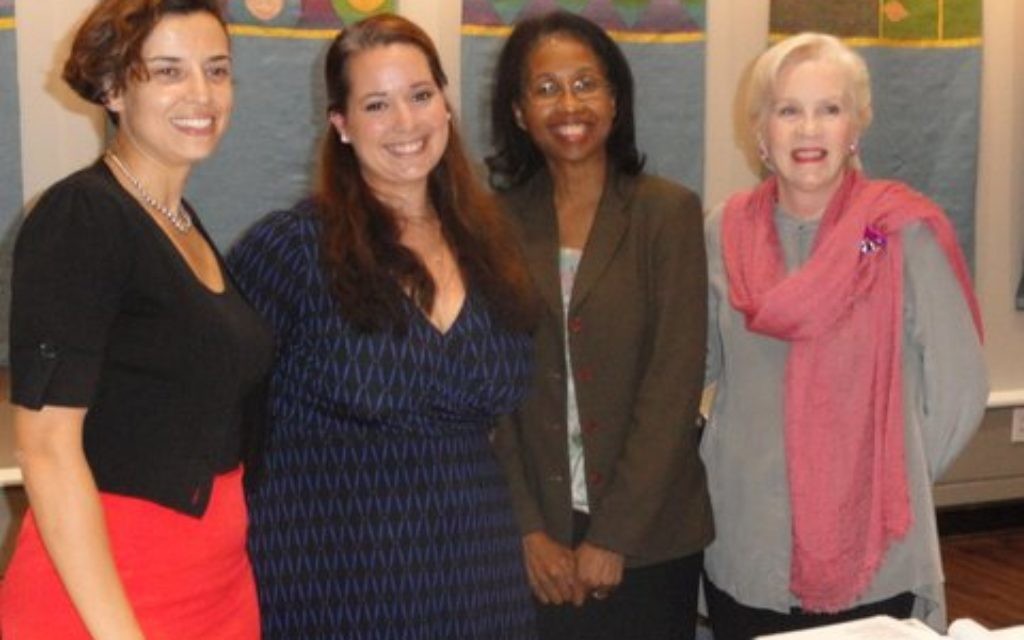Sexploitation for a Happy Meal
Panel exposes the realities of human trafficking
Human trafficking is a problem that can be found in any American city or neighborhood, and it’s not going away. That’s according to Paula Zucker, the president of Greater Atlanta Hadassah, in her introductory remarks at a panel discussion Wednesday, Oct. 7.
The event at Congregation B’nai Torah presented viewpoints from locals who are dealing with the issues of exploitation of children.
Dalia Racine of the DeKalb County District Attorney’s Office explained what human trafficking actually means: “In Georgia it’s anyone who is under 18, or an adult, who is being coerced or deceived into being sold to the sex trade for sexual servitude.”
Get The AJT Newsletter by email and never miss our top stories Free Sign Up
Sold can mean a number of things. “We’ve had cases where a 14-year-old was being sold to the cable man in exchange for connection in an apartment. It’s for a Happy Meal at McDonald’s. It’s for a car payment. That’s enough (to qualify) as human trafficking,” Racine said. “There are different ways that kids are being exchanged for goods and services and as a commodity, and exploiters have no problem with looking at our own children as something to trade or benefit from.”

While anyone can become a victim of human trafficking, the most vulnerable targets are women and children, particularly runaways and homeless youths, Zucker said. She cited figures from the Department of Justice claiming that 300,000 children are at risk of being trafficked every year in the United States, where the average age to enter prostitution is 12 to 14 for girls and 11 to 13 for boys.
“Wrap your mind around that,” said Racine, a mother of three. “I think of the mental capacity of a child that age, how easy it is to manipulate them, how easy it is to coerce them.”
One of the biggest risk factors is homelessness, the panel agreed, and most runaways are approached by an exploiter within 48 hours of leaving home. “It’s always striking to me, the number of young people impacted by trafficking,” said Lorie Davidson, the clinical director of Covenant House, a shelter for homeless youths. “It’s deeply disturbing how quickly these traffic teams will move victims all across the United States. They have a very sophisticated operation. We’ve had people who have tried to recruit within Covenant House, so we have to be hyper-vigilant.”
Exploiters use social media to lure vulnerable children. “Instagram has become a way that individuals are being recruited with what appear to be legitimate jobs,” Davidson said. “They show up for a job interview and instead become a victim.”
Racine agreed, adding that the top seller of children is a website “where you can buy a car, a fridge or a 14-year-old. It used to be Craigslist until they shut down their erotic services. The Internet is the No. 1 way that children are being sold now.”
Racine added: “Who are our pimps and exploiters? It’s not who you would typically think. Quite frankly, they are your neighbors. They are the people who go to your doctor’s office and to your schools. They are the parents of the kids that your kids play with. They’re your bosses, your co-workers. If you think about it, you can’t be a pauper to go and buy sex. You must have some disposable income.”
A study found that 42 percent of purchasers were from north of the Perimeter, Racine said. “When we make an arrest, the majority of the time he’s got a family, kids, he’s got a good job. We don’t care. We’re going after him nonetheless.”
“He could the person sitting next to you on a plane or a train,” Zucker said.
Davidson also tried to counter misconceptions. “What we envision to be an exploiter is not always the case. It’s not always a man; it’s rarely a scary-looking man. It may somebody who is your boyfriend or girlfriend or your soccer coach or your best friend’s mom. We really want to give our young people an accurate picture of what they may encounter and then give them the tools.”
“The best way we can combat this is through education, and stop turning our heads from what is right in front of our faces,” Racine said. “We can no longer give it a pass and say it’s the oldest profession in the world, not when it’s destroying families and communities for generations to come.





comments